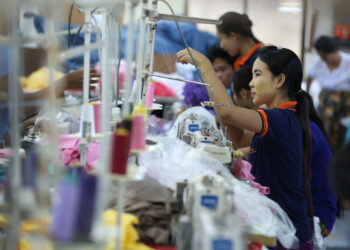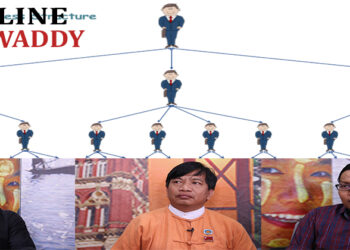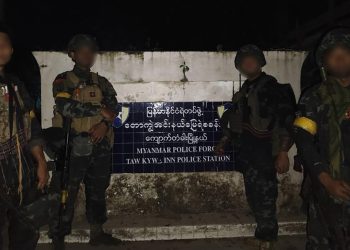Welcome to Dateline Irrawaddy! This week, we’ll discuss a recent strike at a Korean-owned garment factory in Thadukan Industrial Zone 2 in Shwepyithar [in Yangon Region]. The workers staged the strike because the employer failed to pay fees for government social security. So, we’ll discuss workers and social security, how the government manages social security funds, and the National League for Democracy (NLD) government’s handling of labor issues. Vice-Chairman of the Union Lawyers and Paralegals Association and lawyer U Htay, and Assistant General Secretary of the Confederation of Trade Unions in Myanmar Daw Phyo Sandar Soe join me to discuss this. I’m The Irrawaddy’s Burmese editor, Ye Ni.
As I’ve said, workers at a Korean-owned factory in Thadukan Industrial Zone in Shwepyithar staged a strike after the employer failed to pay the fees for government social security. What entitlements does the Social Security Law grant employees? How well is the social security system functioning?
U Htay: The Social Security Law was enacted in 1954 after independence. The new version was adopted in 2012. Considering that the law was promulgated in 1954, Myanmar has considerable experience with social security. Social security funds have been collected since 1956, so substantial funds have accumulated.
The law has five objectives, and the primary objective is to support the development of the state’s economy by increasing production to provide more security in the social life and health care of workers. As everyone knows, medical expenses are quite high today and food prices are also high, and many struggle to make ends meet. Under such circumstances, workers are demanding their rights in many places. The social security system is intended to meet their needs and ensure good industrial relations. The [new] Social Security Law was enacted in 2012 to cover high medical, education and accommodation expenses for workers. The law aims to boost workers’ productivity to support the development of the national economy.
The social security system provided under the law is very good. The 1954 law only covered factory workers. There were only two types of social security benefits, but the new law provides seven types of social security benefits. Article 13 outlines these social security benefits.
Article 13(a) is about the health and social care system that covers medical treatment and cash benefits for sickness and maternity, as well as post-retirement medical benefits and funeral benefits in case of death due to any cause.
Article 13(b) is the family assistance insurance system that covers scholarships for children of the insured, who earn less than the stipulated income, health care and aid benefits in times of natural disaster, and suitable benefits for dependent family members. The employer and employee each have to pay [an amount equal to] 2 percent of the employee’s monthly salary to the social security fund for the employee to be able to enjoy those benefits.
Article 13(c) covers disability benefits, superannuation benefits [pension plans] and the survivors’ benefit insurance system [life insurance]. This system provides benefits for those who are unable to work and those who have retired after reaching the official retirement age, such as civil servants. It also provides benefits for [family members] when the insured die. For this benefit, the employer and employee each have to pay 3 percent of the employee’s monthly salary to the social security fund. However, those benefits are still only on paper and haven’t been disbursed.
Article 13(d) is about the unemployment benefit insurance system. For this benefit, the employer and employee each have to pay 1 percent of the employee’s monthly salary to the social security fund. This benefit is also still only on paper.
Article 13(e) covers other social security systems. One of them is the right to live, hire, purchase, own or use the social security housing established under housing plans for the insured, in accordance with the stipulations. As everyone knows, employees have to spend one-fourth of their salaries on accommodation. So the Social Security Law covers this aspect. The law stipulates compulsory registration for the social safety net as well and also outlines other social security systems for voluntary contribution.
There are a total of seven types of social security benefits stipulated in the law, but only three of them are being distributed for the time being. There are barriers to being able to fully enjoy the three social security benefits. Trade union leaders will know most about these [barriers].
YN: According to the Social Security Law, besides the employers and employees, the government also has to pay its share of contributions to the social security funds. As there are millions of employees in Myanmar, are employees satisfied with the government’s handling of labor issues? What are the challenges?
Phyo Sandar Soe: Social security is an entitlement and employees must be given it. There will always be demand for social security benefits, and [some] employees will always be greedy. We trade union leaders will always want greater benefits for employees. There are 22 million people employed in Myanmar. Of them, 1.4 million are registered on the government social safety net.
Myanmar operates a health and social care insurance system and an employment injury insurance benefit system. At present, the Social Security Board is implementing those two. The board is working to introduce reforms to the operation on the ground. But for the time being, employees are frustrated as there are delays in receiving social services. So, whenever there is a tripartite meeting between the [representatives] of the government, employers and employees, we call for efficient and effective provision of social services.
For example, if an employee wants to take a day of sick leave, he has to spend hours at the social security clinic to get the endorsement for the leave. So, he has to spend almost half of the day there, while he only takes a day of leave. Regarding the withdrawal of social security benefits, there are delays. The Labor Ministry is understaffed and the process is largely based on [hard copy] paperwork even though there are 1.4 million registered employees. In addition, employees have to suffer. There are delays in receiving medical treatment, getting medical leave and obtaining social security benefits. The majority of insured employees want the procedures to be simplified and efficient. As employers and employees pay their shares to the social security funds, they want better medical services. For example, they want there to be sufficient doctors and nurses, good medicine and good facilities at social security-funded hospitals and clinics. There is still a lot to be done to reform those aspects.
YN: U Htay, you said employees only enjoy some of the entitlements enshrined in the Social Security Law. I think the government, which is implementing labor policy, is responsible for this. What is your assessment of the labor policy of the NLD government? Are you satisfied with it?
UH: The election manifesto of the NLD states its labor policy. Though the NLD won in a landslide in the [2015] election, when it formed the government, the Minister of Labor, Immigration and Population, in particular, was not part of the democratic shift…the [bureaucratic] system is the same old system. The permanent secretary and all directors-general of departments were transferred from the military.
It’s partly that the NLD government has little interest in labor issues and partly that the current minister has shown weakness in handling labor issues. As a result, there are problems regarding labor rights, forcing workers to press their demands for their rights. When they think [their rights] are not adequate, they take to the streets and finally even go to the office of the regional chief minister [in some cases in Yangon]. They take to the streets because the government fails to settle labor issues in time, in line with existing labor laws.
Industrial disputes can be settled according to the Settlement of Labor Dispute Law. Most of the employees work to support their families. When they don’t get social security benefits for injuries at work, this creates trouble for their families. We have seen many cases like that when we engage in labor issues. There was a case in which an employee was fired even though the social security doctor recommended he be given leave. We even brought the case to the arbitration council, but we lost. In a similar case, an employee lost consciousness at work. The management did nothing, so a colleague sent him to the hospital and the colleague was punished for that. In the case of the Master Sports shoe factory, an employee died unnecessarily as he was not allowed to leave the factory for medical treatment during working hours. There have been similar cases at many factories.
Employees working at companies in Yangon do not enjoy their full entitlements according to the law. For example, female employees do not get full maternity leave. As laws have not been properly enforced, either under the previous government or under the current government, employees cannot enjoy rights enshrined in the law. Employees can enjoy only three of the seven types of social security benefits.
Social security housing is a very good initiative. We submitted plans for a social security [housing] initiative in 2012 and 2013 [to the Minister of Labor of the previous government]. We were almost able to reach an agreement on it, but the plan never amounted to anything as the minister changed during the transfer of power. During a meeting in 2018 which was attended by senior officials who served in the Ministry of Labor under the previous government, I reminded them about the social security housing initiative. The current Yangon Region chief minister attended the meetings [on social security housing] as a Lower House lawmaker in 2012-2013.
The Social Security Law also mandates establishing housing for workers, but the government has no interest in it. The cost of accommodation is high while salaries are low. The rent for a small apartment is around 100,000 kyats [US$66 per month]. Even though we are making efforts, the current government and concerned ministry have no interest in it, and there is little implementation.
There is also negligence by employers. According to the law, employers have to report to the township Social Security Board if an employee suffers from a condition in the workplace. Concerned government officials also have to report if they find problems with occupational safety in the workplace. But they barely do so and employees die unnecessarily. We have found that some employers fail to pay their share of contributions to the social security fund. And the Social Security Board has failed to organize forums and workshops with civil society organizations (CSOs) on a wide scale [regarding employers’ obligations under the law]. We lack a platform to raise labor issues. The current government or the Labor Ministry should listen to the voices of employees and CSOs, and the aggrieved parties.
YN: But then, there might be budget constraints on the government regarding implementation of social security systems. As millions of workers pay into the social security funds, however, the amount should be substantial. Does the government spend those social security funds with transparency and accountability? What is your view?
PSS: We, as unions, were allowed to take an active part in the Social Security Board as of 2017. We don’t know about the situation before that. At the meetings since 2017, we have asked the government and the Social Security Board about social security funds. The Ministry of Labor has explained how money is spent. Usually, money is collected [from employers and employees] for two type of social insurance. The Social Security Board has not yet collected money for the social security housing projects. Money is at present collected for health, social, and employment injury insurance, so a total of 5 percent [of salaries] is collected [from employers and employees]. As far as we know, less than 1.5 percent [of the salaries] has been spent. There are 1.4 million workers registered with the Social Security Board. Employers pay 3 percent and employees pay for 2 percent. So, there is 5 percent times 1.4 million every month. But less than 1.5 percent [of the salaries] is spent, so they have money.
We are in urgent need of reforms to provide better service. The Social Security Board is considering undertaking four reforms. The law still has some weaknesses. So, there is a need for legal reform. There is also a need to simplify procedures. If the procedures are too complicated, employees do not want to apply for the payment. So, [second] there is a need for administrative reform. We, as part of tripartite stakeholder meetings, are working for it. The third is medical reform. In providing medical services, the provider and the purchaser are the same [within the government]. So, there is a need to split the two. We call this a provider-purchaser split. We are trying to get employees access to better medical services.
The last is IT reform. You have questioned the transparency of social security funds. Here I would like to point out how important computerization and digitalization are. People are concerned that social security funds will not be spent properly. If we can carry out IT reform, this problem will be solved. Because we have ID numbers [in social security cards], if we digitalize this system, once you type your numbers in on the internet, you will know instantly if your employer has paid the money to social security funds for you, so employers won’t be able to lie, and people can calculate the amount [their employer has paid]. This will automatically solve problems of fraud. So, there is an urgent need to switch to digital governance. I would like to urge policymakers to help the Social Security Board to be able to computerize the system. If we can, then people will have access to information about how much money is in social security funds and what money has been spent.
So, to answer your question, the Social Security Board has money, and only a small percentage has been spent. They have the financial capability to transform to a better social security system. We only need to start the change.
YN: Thank you for your contributions!
#IRWLaborRights
You may also like these stories
Myanmar Security Forces, Civilians Rescued; Ferry Owner, Crew Interrogated After AA Abduction
Thai Govt to Compensate Families of Myanmar Workers Killed in Construction Collapse

















